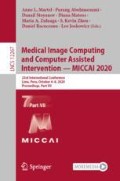Abstract
Predicting the progression of preclinical Alzheimer’s disease (AD) such as subjective cognitive decline (SCD) is fundamental for the effective intervention of pathological cognitive decline. Even though multimodal neuroimaging has been widely used in automated AD diagnosis, there are few studies dedicated to SCD progression prediction, due to challenges of incomplete and limited data. To this end, we propose a Joint neuroimage Synthesis and Representation Learning (JSRL) framework with transfer learning for SCD conversion prediction using incomplete multimodal neuroimaging data. Specifically, JSRL consists of two major components: 1) a generative adversarial network for synthesizing missing neuroimaging data, and 2) a classification network for learning neuroimage representations and predicting the progression of SCD. These two subnetworks share the same feature encoding module, encouraging that the to-be-generated representations are prediction-oriented and also the underlying association among multimodal images can be effectively modeled for accurate prediction. To handle the limited data problem, we further leverage both image synthesis and prediction models learned from a large-scale ADNI database (with MRI and PET acquired from 863 subjects) to a small-scale SCD database (with only MRI acquired from 113 subjects) in a transfer learning manner. Experimental results show that the proposed JSRL can synthesize reasonable PET scans and is superior to several state-of-the-art methods in SCD conversion prediction.
Access this chapter
Tax calculation will be finalised at checkout
Purchases are for personal use only
Notes
References
Jessen, F., et al.: A conceptual framework for research on subjective cognitive decline in preclinical Alzheimer’s disease. Alzheimer’s Dement. 10(6), 844–852 (2014)
Amariglio, R.E., et al.: Subjective cognitive complaints and amyloid burden in cognitively normal older individuals. Neuropsychologia 50(12), 2880–2886 (2012)
Buckley, R.F., et al.: A conceptualization of the utility of subjective cognitive decline in clinical trials of preclinical Alzheimer’s disease. J. Mol. Neurosci. 60(3), 354–361 (2016). https://doi.org/10.1007/s12031-016-0810-z
Kryscio, R.J., et al.: Self-reported memory complaints: implications from a longitudinal cohort with autopsies. Neurology 83(15), 1359–1365 (2014)
Liu, M., Zhang, J., Yap, P.T., Shen, D.: View-aligned hypergraph learning for Alzheimer’s disease diagnosis with incomplete multi-modality data. Med. Image Anal. 36, 123–134 (2017)
Mitchell, A., Beaumont, H., Ferguson, D., Yadegarfar, M., Stubbs, B.: Risk of dementia and mild cognitive impairment in older people with subjective memory complaints: meta-analysis. Acta Psychiatrica Scandinavica 130(6), 439–451 (2014)
Kawachi, T., et al.: Comparison of the diagnostic performance of FDG-PET and VBM-MRI in very mild Alzheimer’s disease. Eur. J. Nuclear Med. Mol. Imaging 33(7), 801–809 (2006). https://doi.org/10.1007/s00259-005-0050-x
Zu, C., Jie, B., Liu, M., Chen, S., Shen, D., Zhang, D.: Label-aligned multi-task feature learning for multimodal classification of Alzheimer’s disease and mild cognitive impairment. Brain Imaging Behav. 10(4), 1148–1159 (2016). https://doi.org/10.1007/s11682-015-9480-7
Liu, M., Zhang, J., Adeli, E., Shen, D.: Landmark-based deep multi-instance learning for brain disease diagnosis. Med. Image Anal. 43, 157–168 (2018)
Jack Jr, C.R., et al.: The Alzheimer’s disease neuroimaging initiative (ADNI): MRI methods. J. Mag. Reson. Imaging: Off. J. Int. Soc. Magn. Reson. Med. 27(4), 685–691 (2008)
Yue, L., et al.: Asymmetry of hippocampus and amygdala defect in subjective cognitive decline among the community dwelling Chinese. Front. Psychiatry 9, 226 (2018)
Frisoni, G.B., Fox, N.C., Jack, C.R., Scheltens, P., Thompson, P.M.: The clinical use of structural MRI in Alzheimer disease. Nat. Rev. Neurol. 6(2), 67–77 (2010)
Jie, B., Liu, M., Liu, J., Zhang, D., Shen, D.: Temporally constrained group sparse learning for longitudinal data analysis in Alzheimer’s disease. IEEE Trans. Biomed. Eng. 64(1), 238–249 (2016)
Pan, Y., Liu, M., Lian, C., Xia, Y., Shen, D.: Spatially-constrained Fisher representation for brain disease identification with incomplete multi-modal neuroimages. IEEE Trans. Med. Imaging 39, 2965–2975 (2020)
Yi, X., Walia, E., Babyn, P.: Generative adversarial network in medical imaging: a review. Med. Image Anal. 58, 101552 (2019)
Cheng, B., Liu, M., Zhang, D., Munsell, B.C., Shen, D.: Domain transfer learning for MCI conversion prediction. IEEE Trans. Biomed. Eng. 62(7), 1805–1817 (2015)
Cheng, B., Liu, M., Shen, D., Li, Z., Zhang, D.: Multi-domain transfer learning for early diagnosis of Alzheimer’s disease. Neuroinformatics 15(2), 115–132 (2017). https://doi.org/10.1007/s12021-016-9318-5
Coupé, P., Eskildsen, S.F., Manjón, J.V., Fonov, V.S., Collins, D.L.: Simultaneous segmentation and grading of anatomical structures for patient’s classification: application to Alzheimer’s disease. NeuroImage 59(4), 3736–3747 (2012)
Rusinek, H., et al.: Alzheimer disease: measuring loss of cerebral gray matter with MR imaging. Radiology 178(1), 109–114 (1991)
Zhang, J., Liu, M., Shen, D.: Detecting anatomical landmarks from limited medical imaging data using two-stage task-oriented deep neural networks. IEEE Trans. Image Process. 26(10), 4753–4764 (2017)
Wang, M., Zhang, D., Huang, J., Yap, P.T., Shen, D., Liu, M.: Identifying autism spectrum disorder with multi-site fMRI via low-rank domain adaptation. IEEE Trans. Med. Imaging 39(3), 644–655 (2019)
Acknowledgements
This work was finished when Y. Pan was visiting the University of North Carolina at Chapel Hill. Y. Liu and Y. Pan contributed equally to this work.
Author information
Authors and Affiliations
Corresponding authors
Editor information
Editors and Affiliations
Rights and permissions
Copyright information
© 2020 Springer Nature Switzerland AG
About this paper
Cite this paper
Liu, Y. et al. (2020). Joint Neuroimage Synthesis and Representation Learning for Conversion Prediction of Subjective Cognitive Decline. In: Martel, A.L., et al. Medical Image Computing and Computer Assisted Intervention – MICCAI 2020. MICCAI 2020. Lecture Notes in Computer Science(), vol 12267. Springer, Cham. https://doi.org/10.1007/978-3-030-59728-3_57
Download citation
DOI: https://doi.org/10.1007/978-3-030-59728-3_57
Published:
Publisher Name: Springer, Cham
Print ISBN: 978-3-030-59727-6
Online ISBN: 978-3-030-59728-3
eBook Packages: Computer ScienceComputer Science (R0)


